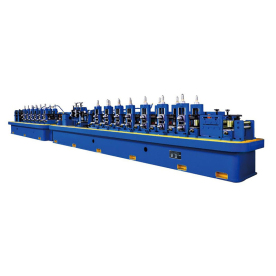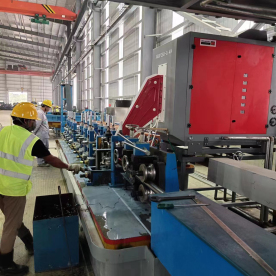[Pipe mill production line with quality control measures]Ensuring Quality Control in Pipe Mill Production Line: Key Measures to Improve Efficiency and Consistency
News 2024-6-2
Quality control is crucial in any manufacturing process, but it's especially important in the production of pipes. Pipes are used in a wide range of applications, from plumbing and construction to oil and gas pipelines. The quality of these pipes can have a significant impact on the safety and performance of the systems in which they are used. That's why it's essential for pipe manufacturers to implement robust quality control measures throughout the production process.
One key area where quality control is particularly important is in the pipe mill production line. The pipe mill production line is where raw materials are transformed into finished pipes through a series of processes such as forming, welding, and sizing. Any defects or inconsistencies in the production line can result in substandard pipes that may fail to meet industry standards or perform as expected.
To ensure the quality of pipes produced in the mill, manufacturers must implement various quality control measures. These measures include:
1. Material Testing: The first step in ensuring quality control in the pipe mill production line is to conduct thorough material testing. This involves testing the raw materials used in the production of pipes to ensure they meet the required specifications for strength, durability, and composition. By carefully selecting and testing materials, manufacturers can avoid defects and inconsistencies in the finished pipes.

Ensuring Quality Control in Pipe Mill Production Line: Key Measures to Improve Efficiency and Consistency

Ensuring Quality Control in Pipe Mill Production Line: Key Measures to Improve Efficiency and Consistency
3. Dimensional Control: Another important aspect of quality control in the pipe mill production line is dimensional control. Pipes must meet precise dimensional tolerances to ensure they fit correctly in systems and structures. Manufacturers can achieve dimensional control by using advanced measuring and inspection equipment to verify the diameter, wall thickness, and length of the pipes at various stages of the production process.

Ensuring Quality Control in Pipe Mill Production Line: Key Measures to Improve Efficiency and Consistency
5. Process Monitoring: Continuous monitoring of the production process is essential for maintaining quality control in the pipe mill production line. Manufacturers can use various sensors and monitoring systems to track key parameters such as temperature, pressure, and speed to ensure that the processes are running smoothly and consistently. By monitoring the production process in real-time, manufacturers can quickly identify and address any deviations or anomalies that could affect the quality of the pipes.
By implementing these quality control measures in the pipe mill production line, manufacturers can improve the efficiency and consistency of their operations, resulting in high-quality pipes that meet industry standards and customer expectations. Quality control is not only essential for ensuring the safety and reliability of pipes but also for building a reputation as a trusted and reliable pipe manufacturer.
